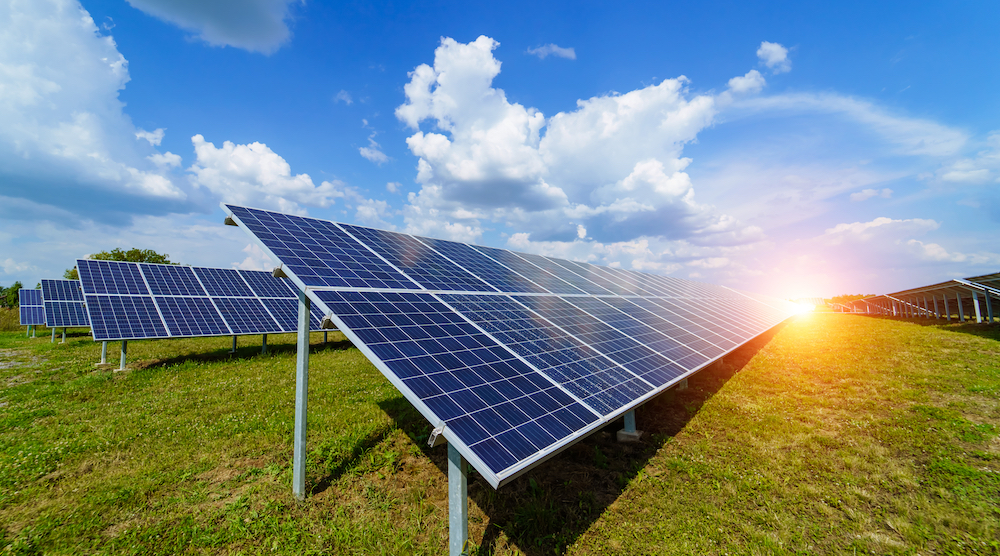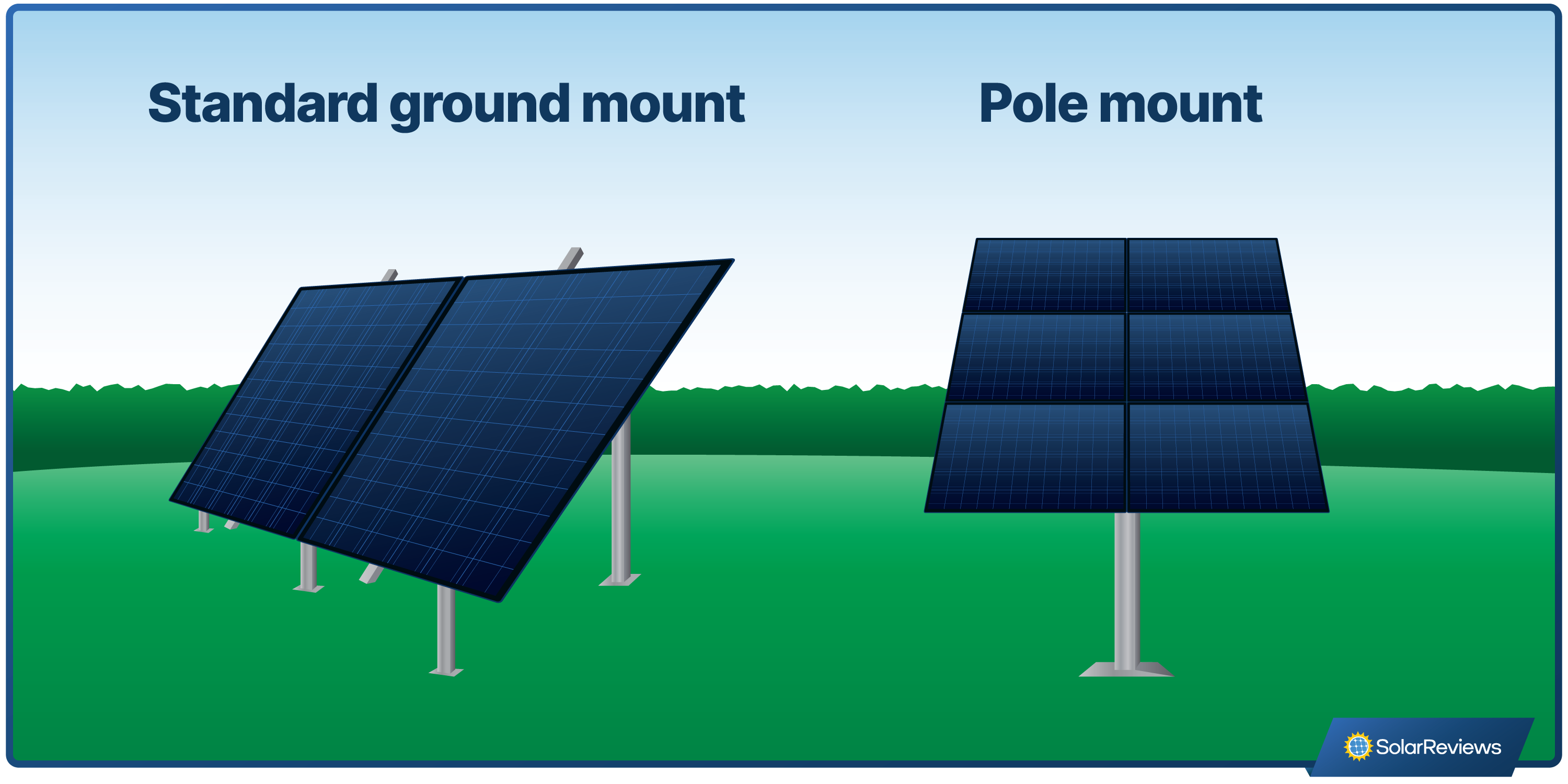
Find out what solar panels cost in your area
Ground-mounted solar panels are a great alternative for customers who want solar – but don’t have a roof that’s suitable for them.
On top of being an alternative to rooftop solar, ground-mounted solar systems can be used on farms, in your garden, and more!
In this article, we’ll explain what a ground-mounted solar system is and if you should consider it for your property.
Key takeaways
-
Ground-mounted solar energy systems are an excellent alternative to standard rooftop solar installations
-
The big benefit to ground-mounting is that it lets you position your solar panels for optimal performance.
-
On the flip side, ground-mounted setups cost more than equivalent rooftop setups.
-
If you have a large property with energy usage, a ground-mounted system might be worth it for you.
What is a ground-mounted solar panel system?
A ground-mounted solar power system is just what it sounds like - a system of solar panels that are mounted on the ground on your property, rather than on the roof of your house.
A ground-mounted solar power system is just what it sounds like – a system of solar panels installed at ground level, rather than on the roof of your house.
Depending on your choice of racking system, the solar panels will be positioned a few inches to several feet above the ground.
Module-level power electronics, required for rapid shutdown, will be attached to the panels, but other system components can be located some distance away, so you can put temperature-sensitive equipment like string inverters and solar batteries in your garage.
With ground-mounted installations, you have the flexibility to work with solar panels of any size, including large ‘commercial’ modules featuring 72 cells (or 144 half-cells) or more, whereas rooftop systems are typically restricted to 60-cell panels which are smaller and lighter.
Ground-mounted solar panels can be installed anywhere with good sun exposure and sufficient amounts of open space – a minimum of 350 square feet is usually required.
Ground-mounted solar panels are also known as backyard solar panels, free-standing solar panels, and ground-mount PV systems.
What are the different types of ground-mount solar installations?

Standard ground mount
Standard or traditional ground mounts use multiple small anchors to support a racking table for the solar panels. Many anchor types can be used, including concrete piers (most common), driven piers, helical piles, and concrete ballasts. The best anchoring method for you will depend on your ground conditions.
Standard ground mount systems typically hold the solar array in a fixed position, although options for manual adjustment are gaining popularity.
The standard ground-mount system is the easiest and most cost-effective solution for a ground install, and also the most popular.
Pole mount
To build a pole-mount solar system, you’ll dig a single deep hole in the ground. It’ll hold a large pole, upon which you’ll connect your rails and mount your solar panels.
Pole-mount systems offer greater clearance from the ground, which is useful in avoiding foliage or other ground obstructions. We’ve even seen animals grazing and taking shelter from the sun underneath them!
Another advantage of pole mounts is that they can easily incorporate a single-axis or dual-axis tracking system; these enable the panels to follow the sun over the course of the day and thus produce more energy.
On the flip side, pole mounts with tracking systems have a higher cost per watt, so it’s usually more cost-effective to buy a standard ground-mount array featuring a greater number of panels.
What are the pros and cons of ground-mounted solar panels?
Here’s what to consider if you’re thinking about going solar with a ground-mounted solar panel installation.
Pros of ground-mounted solar panels | Cons of ground-mounted solar panels |
|---|---|
Great way to bypass any roof issues, existing or potential (limited space, structurally weak roof, etc.) | More expensive than a rooftop solar system |
Higher energy production, as you can position your solar panels in the optimal direction and angle | Takes up valuable real estate |
Easy to clean and maintain | Affects the home's overall aesthetic |
| Harder installation process |
The biggest advantage with ground-mounted solar panels is that they offer greater control over your solar panel direction and angle. Solar panels need to face either south or southwest to receive maximum direct sunlight. On flat ground, you can position solar panels in any direction you want to maximize sun exposure, unlike on a slanted roof.
This advantage means ground panels often receive more sunlight, allowing them to generate more solar power, thus saving you more money.
Your roof may also have obstructions, such as a skylight or chimney, which would make it difficult to install panels there. The ground generally provides more room to install more panels than the roof does.
On the other hand, panels on the ground can interfere with your home's overall aesthetic more than they would on the roof. Installation of ground panels also takes significantly more time and effort and is generally more expensive than rooftop panels.
However, if your ground-mounted system is also able to produce more energy, then this extra cost can be offset over time.
Are ground-mounted solar panels right for my home?
If your home uses a lot of energy, then ground-mounted panels might be better for you. This is particularly true if you have a lot of open space on your property, allowing you to install more solar panels than you can fit on your roof. Installing a larger system will allow you to generate more power and better meet your needs.
Of course, if your yard is on the small side, there might not be enough room to install as many panels as you need. Additionally, if you don’t have the extra space, installing solar panels on the ground will leave little to no room for your lawn, flower beds, or other landscaping. If that's important to you, then rooftop panels may be a better option.
Ground mounts are more common for certain types of solar systems, like off-grid setups. But they can be used by anyone if they have the space!
There are other options if your roof isn’t suitable for solar panels; you can also consider a solar carport, a solar patio, or even a solar tree!
How many ground-mounted solar panels will I need?
The average home requires about 19 solar ground-mounted panels.
Here are the back-of-the-envelope calculations used to reach this figure:
Let’s assume the use of 400-watt panels and a location that gets 4 peak sun hours per day. Each solar panel will produce 1.6 kWh (1,600 watt-hours) of electricity per day.
Average household energy usage is around 900 kilowatt hours (kWh) of electricity per month or 30 kWh per day.
To build a solar system capable of covering average energy usage, you’d need at least (30 kWh / 1.6 kWh =) 19 solar panels.
Your home’s electricity usage and sunlight availability may be different from average, of course. To find out the exact number of solar panels required by your home, use our advanced solar calculator below.
What are the best ground-mounted solar panels?
Here are the top five companies that provide ground-mounted solar panels.
Qcells: With high-quality solar panels and U.S. manufacturing, Qcells are one of the best in the business.
Maxeon (formerly SunPower): Maxeon has the most efficient panels, but they’re expensive.
REC Group: REC panels are known to deliver excellent performance.
Trina Solar and Canadian Solar: These solar manufacturing giants sell highly-reliable panels at budget prices.
Compare two top brands here: Qcells vs REC
Can I perform a DIY installation using a ground-mount solar kit?
Yes, some homeowners have been successful with DIY ground-mount solar panel installations.
When it comes to buying the equipment, you can either find a special ground-mount solar kit or ask an equipment supplier to adapt a standard rooftop kit for you by swapping out the mounting & racking equipment.
However, DIY ground-mount installations are generally considered more challenging than rooftop jobs since you’ll need to use concrete and perhaps even an excavator when anchoring the array.
Final thoughts on ground-mounted solar panels
Ground-mounted solar panels can provide a number of advantages over standard rooftop panels. The extra energy they're able to produce can make them well worth the price. Do some research on your own, and talk to your local solar installer to find out how ground-mounted solar panels can best help you meet your home's energy needs.
Zeeshan is a journalist who has covered energy, climate, and environmental topics for major news organizations. As a former member of the SolarReviews editorial team, he created content focused on solar energy and sustainable home solutions for homeowners. He has also worked in nonprofit communications and the humanitarian sector, including with Doctors Without Borders, and served as an organizer for the Pakistan Youth Climate Network. Zeeshan ...
Learn more about Zeeshan Hyder